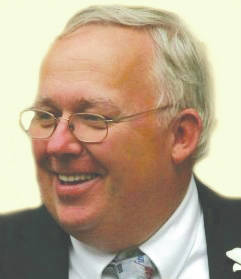Every Christian should study the Bible. If all you are getting are a few verses and a page or so of commentary (this column, for example) from time to time, your spiritual life will be, at best, anemic. Going to church every time the doors are open will not be enough to live the Christian life victoriously either.
God puts great emphasis on the study of the Scriptures. 2 Timothy 2:15, “Study to shew thyself approved unto God, a workman that needeth not to be ashamed, rightly dividing the word of truth.”
Study of any subject should give us knowledge of a said topic, but the study of God’s Word allows us to show that God approves of our life. Notice the action words in the verse – “shew” if you are going to show, or prove something, more than knowledge is needed. Example – someone may know a lot about cars, but they become an approved mechanic by fixing cars.
“A workman” — again, more than know-how is needed here. Work is involved. The knowledge gained through study brings about action. A doctor, for instance, learns an immense amount of knowledge during medical school, then uses that knowledge to treat patients and hone her skills.
“Needeth not to be ashamed” — Once the knowledge gained is put to use, and skills increased, mistakes become fewer, and a person can be proud of the mechanic, doctor, garbageman, or whatever work they do.
“Rightly dividing the word of truth” — An ever-growing knowledge, leading to proper actions, ending in a job well done.
Bringing the earthly examples to spiritual truth; 2 Timothy 2:15 tells us we are to study the Word of God so that our lives can be something God will have great pleasure in, the combination of which leads us to a victorious life within the will of God. The study of Scripture is therefore critical.
Many people claim to have trouble understanding the Bible. Let us address some of the issues that may cause a cloudy view of what a person reads in the Holy Writ.
The Bible covers nearly every everyday issue imaginable alongside eternal topics. Subjects like money, marriage, employer/employee relationships are right alongside topics like eternity, salvation, forgiveness, and redemption. A mere mortal writing a book on life would most likely have a separate chapter on each subject. Chapter four is all about money, chapter two is the marriage chapter and so on, but God interweaves all topics throughout all other issues.
Sometimes, the same story s told several times, but from different perspectives; the four gospels is an excellent example of this. All four tell the life story of Jesus. Matthew tells about Jesus as King of the Jews, Mark speaks to the servant nature of our Saviour, Luke gives the human side of Christ, while John reveals Jesus as God.
Often the Bible will give the general gist of a story, then chapters, or even, books later, come back to the story and fill in the detail.
Also, by its own admission, the Bible contains milk and meat. Think of it this way: A school textbook on history that has details simple enough for a kindergartner to understand but also interwoven within the text are thoughts and theory meant for the graduate student.
All the above is precisely why the study of the Scripture is required. Most people can read through any how-to book a few times and have a good grasp how to accomplish the given task, but the how-to book on life – the Bible – well, the one-hundredth time through it, you will still glean something from its pages.
Last, but maybe most important, the problem may be spiritual. 1 Corinthians 2:11-14, “For what man knoweth the things of a man, save the spirit of man which is in him? even so the things of God knoweth no man, but the Spirit of God. Now we have received, not the spirit of the world, but the spirit which is of God; that we might know the things that are freely given to us of God. Which things also we speak, not in the words which man’s wisdom teacheth, but which the Holy Ghost teacheth; comparing spiritual things with spiritual. However, the natural man receiveth not the things of the Spirit of God: for they are foolishness unto him: neither can he know them, because they are spiritually discerned.”
The passage points out that the Spirit of God is the one that teaches us the things of God. Christians receive the Holy Spirit at salvation. The passage also states that those without the Spirit of God cannot know the things of God. Those without the Spirit will not comprehend it.
This indwelling of the Holy Spirit does not mean that the children of God are instant theologians. As the Bible explains, we must start with milk before progressing onward to meat (1 Corinthians 3:2; Hebrews 5:12). However, what it does mean is, if the difficulty of understanding the Scripture persist over some time, it is more likely a spiritual problem as opposed to an educational one.






